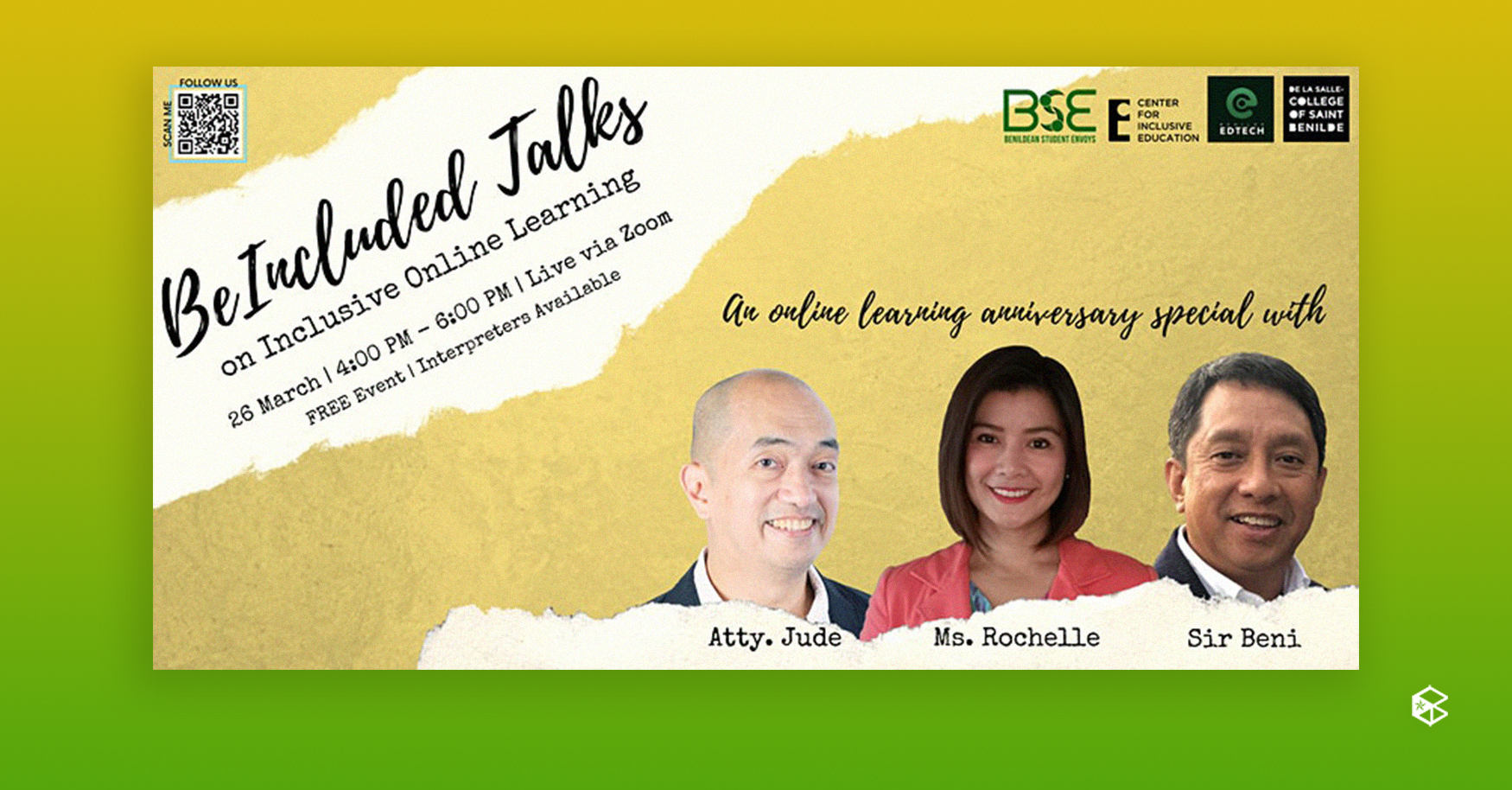The Center for Inclusive Education (CIE) and the Center for Educational Technology (CET), along with the Benildean Student Envoys (BSE), spearheaded a webinar featuring three Benildean educators titled “BeIncluded Talks” that aimed to share tips to educators on how to make online learning more inclusive on March 26 via Zoom.
Vice Chancellor for Academics Geronio Ulayao officially commenced the webinar with his opening remarks, highlighting the journey of Benilde CIE’s establishment.
“Benilde’s journey in establishing the CIE [was carried out by the] institutional commitment [of Benilde] to inclusion that paved the way and facilitated the materialization [of the CIE],” Mr. Ulayao said.
Inclusivity in online learning
Mr. Beni Alfred Estepa, School of Multidisciplinary Studies faculty member and a member of Benilde's CET, gave a presentation entitled "As we moved to online remote learning,” emphasizing the sudden shift to online modality a year ago and the steps made by the College’s CET to adjust with the online modality.
“This is how our classroom looked like ever since,” Estepa stated while flashing a traditional classroom on screen. “Maybe it was wiser to continue [online] than do nothing at all,” he continued.
Estepa also shared that he thought the situation was temporary until such time he realized online learning is here to stay.
Moreover, he also discussed that CET prepared for training and provided assistance to Benildean professors in migrating their materials to online platforms in preparation for the online modality, stating that CET “technologically prepared and equipped them [professors].”
However, Estepa discussed that pedagogy, a method of teaching that will suit learners, is more important than technology in online learning.
“As we go on, we have realized that something is missing, something is left behind that is more important than technology. [...] Understanding who your learners [is advised] so you can best decide what strategy to use. [If your current approach is not effective] try to deliver lectures in another way,” Estepa ended.
Following this, School of Deaf Education and Applied Studies (SDEAS) and Benilde Deaf School faculty member Ms. Rochelle Martin presented "ReDEAFining Learning," highlighting tips and techniques she uses in her online classes.
Among the tips Martin shared is to “change one’s mindset.” She shared that professors cannot bring the same attitude and characteristics of face-to-face classes to online because they are both different platforms, citing that same values must be maintained but strategies must be different.
“My mind has to change and accept that technology is an important part of our lives now [during online learning],” she stated as an example.
She also gave another tip, to achieve tasks with “minimum hustle and maximum impact.”
Martin emphasized on the need for minimum outputs by students with maximum effect to their learnings. “I want my lessons to have impact, not only now, but in the future too. [...] I want to encourage everyone, we can do this,” she stated.
Last to present was Atty. Jude Latore, Human Resource Management Program Chair and a faculty member of the School of Management and Information Technology (SMIT). His presentation revolved around "Inclusive Online Teaching Tips," where he shared four strategies he personally uses in the online classes he handles.
- Neurodiversity
- Recognize the diversity
- Assess the strengths and challenges
- Develop human potential
- Support and accommodate
- Help students value their diverse brains using growth mindset, neuroplasticity and brain forest metaphors
- Whole-class approach
- When formulating lesson plans, Atty. Latore uses the whole-class approach, where he picks important concepts and is essential for the learning of the students.
- The synchronous session a la talk show
- During synchronous classes, he utilizes the time to discuss lectures as if they are in an online show. This includes short lectures, ice breakers, learning activities and others.
The talks were followed by an in-depth discussion on more tips for professors to utilize during their online classes.The speakers were joined by over 160 participants from various universities and schools in the country.
Furthermore, the speakers shared various online applications they utilize during online class to further engage with their students. These include applications such as Seesaw, When2meet.com, Doodly, and Adobe Spark.


